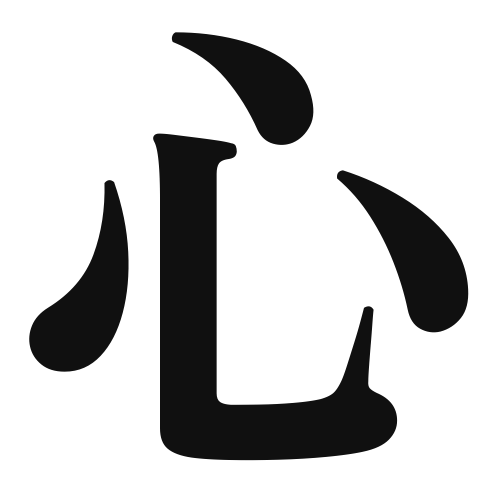1. Overview of Meaning
The kanji “心” (pronounced “kokoro” in Japanese) means “heart” or “mind.” It represents emotions, thoughts, and the essence of a person’s inner self.
2. Formation and Radical
Formation of the Kanji: The kanji “心” is a pictogram that originally depicted the shape of a heart. It is classified as a pictographic character, which means it visually represents its meaning.
Radical: The radical for “心” is also “心” (or “こころ” in hiragana), which is used in various other kanji related to emotions and thoughts.
3. Examples of Usage
Common Words and Phrases: Some frequently used words that include “心” are:
- 心配 (しんぱい, “shinpai”) – worry
- 心臓 (しんぞう, “shinzou”) – heart (organ)
- 心の中 (こころのなか, “kokoro no naka”) – in one’s heart/mind
Example Sentences in Daily Conversation:
- 彼女のことが心配です。 (かのじょのことがしんぱいです。) – I am worried about her.
- 心の中で何を考えているの? (こころのなかでなにをかんがえているの?) – What are you thinking in your heart/mind?
4. Synonyms and Antonyms
Similar Kanji: A similar kanji is “思” (おもい, “omoi”), which means “thought” or “to think.” While both relate to mental processes, “心” emphasizes emotions and feelings, whereas “思” focuses more on cognitive thoughts.
Antonyms: An antonym of “心” could be “冷” (れい, “rei”), which means “cold.” This contrasts with the warmth and emotional aspect of “心.”
5. Cultural and Historical Background
Relation to Japanese Culture: In Japanese culture, “心” is often associated with sincerity and the true essence of a person. It plays a significant role in concepts like “和” (harmony) and “思いやり” (omoiyari, compassion).
Proverbs and Idioms: One common proverb is “心を込めて” (こころをこめて, “kokoro o komete”), which means “to do something with all one’s heart,” emphasizing the importance of sincerity and effort in actions.
